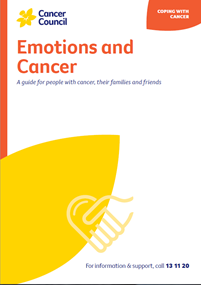- Home
- Cancer Information
- Supporting someone with cancer
- Caring for someone with cancer
- How you might feel as a carer
How you might feel as a carer
It’s common for carers to experience a range of feelings about their new role, and many describe it as an emotional roller-coaster. Often these feelings are similar to those experienced by the person with cancer – some studies show that carers can have even higher levels of distress.
Learn more about:
Overview
It can take time to adjust to the changes that becoming a carer brings. It’s important to give yourself permission to take care of your own emotional wellbeing. If you have a history of anxiety or depression, this could make you more vulnerable now.
You may find it helpful to think about how you have coped with difficult times in the past – learn some strategies that may help you manage your feelings.
For more on this, see Emotions and cancer and listen to our podcast below.
A sense of satisfaction
While caring can be challenging at times, many carers say that it can also be rewarding. Providing support for someone can bring a sense of satisfaction, achievement and personal growth.
Knowing that you are supporting someone during a time of need can help you feel good about yourself. Being there for them and helping, even in small ways, can strengthen your relationship and create lasting memories.
You may not always feel a sense of satisfaction when you’re caring for someone on a day-to-day basis. But some people find that when their caring role ends, they are able to reflect on the positive and rewarding parts of their caring experience.
→ READ MORE: Common reactions of carers
Podcast: Cancer Affects the Carer Too
Listen to more episodes from our podcast for people affected by cancer
Dr Alison White, Palliative Medicine Specialist, Royal Perth Hospital, WA; Tracey Bilson, Consumer; Louise Dillon, Consumer; Louise Durham, Nurse Practitioner, Palliative Care Outpatients, Princess Alexandra Hospital, QLD; Katrina Elias, Carers Program, South Western Sydney Local Health District, NSW Health, NSW; Jessica Elliott, Social Worker, Youth Cancer Services, Crown Princess Mary Cancer Centre, Westmead Hospital, NSW; Brendan Myhill, Social Worker and Bereavement Research Officer, Concord Repatriation General Hospital, NSW; Penny Neller, Project Coordinator, National Palliative Care Projects, Australian Centre for Health Law Research, Queensland University of Technology, QLD; Olivia Palac, Acting Assistant Director, Occupational Therapy, Gold Coast University Hospital, QLD; Nicole Rampton, Advanced Occupational Therapist, Cancer Services, Gold Coast University Hospital, QLD; Shirley Roberts, Nurse Consultant, Medical Oncology, Northern Adelaide Cancer Centre, SA; Dr Elysia Thornton-Benko, Specialist General Practitioner, and UNSW Research Fellow, NSW; Kathleen Wilkins, Consumer; Helen Zahra, Carers Program, South Western Sydney Local Health District, NSW Health, NSW.
View the Cancer Council NSW editorial policy.
View all publications or call 13 11 20 for free printed copies.


